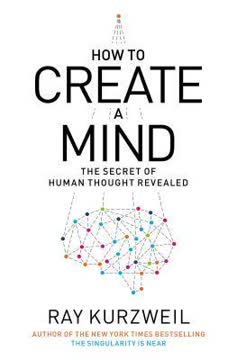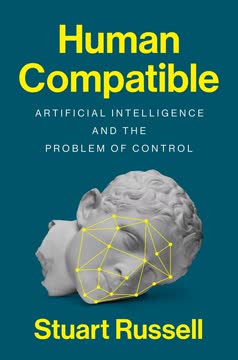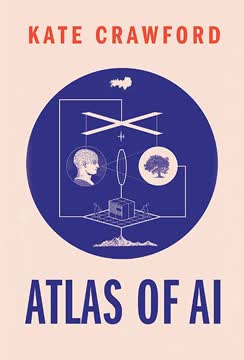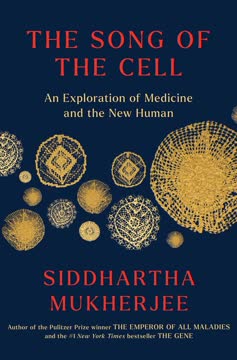Key Takeaways
1. The Thousand Brains Theory: A New Model of Intelligence
Intelligence requires learning a model of the world.
The brain's architecture. The Thousand Brains Theory proposes that intelligence emerges from thousands of individual models of the world, each created by a cortical column in the neocortex. These columns work in parallel, processing sensory inputs and making predictions about the world.
A new paradigm. This theory challenges the traditional hierarchical view of brain function, suggesting instead a distributed system where each column can recognize complete objects and concepts. This model explains how the brain can maintain a stable perception of the world despite constantly changing sensory inputs.
Implications for AI. Understanding the brain's true architecture could revolutionize artificial intelligence, leading to more flexible and robust AI systems that can learn and adapt like human brains.
2. The Neocortex: The Seat of Human Intelligence
The neocortex implements a near universal algorithm, but this flexibility comes with a price.
Structure and function. The neocortex, making up about 70% of the human brain, is responsible for our advanced cognitive abilities. It's organized into columns, each capable of learning and modeling aspects of the world.
Old brain vs. new brain. The neocortex (new brain) works in conjunction with older brain structures (old brain) that control basic functions and emotions. This relationship can lead to conflicts between our rational thoughts and more primitive impulses.
- Neocortex: Flexible learning, reasoning, language
- Old brain: Emotions, instincts, basic survival functions
Evolutionary perspective. The neocortex's expansion in humans has allowed for unprecedented cognitive abilities, but it remains constrained by its connections to more primitive brain structures.
3. Reference Frames: The Building Blocks of Knowledge
Reference frames are the backbone of knowledge.
Defining reference frames. Reference frames are like mental coordinate systems that allow the brain to organize and manipulate information. They are crucial for understanding the structure of objects, planning movements, and even abstract thinking.
Versatility of reference frames. The brain uses reference frames not just for physical objects, but also for abstract concepts. This allows us to understand and manipulate complex ideas in mathematics, language, and other domains.
- Physical reference frames: Understanding object structure, spatial relationships
- Abstract reference frames: Organizing concepts, language, mathematical ideas
Grid cells and place cells. These specialized neurons, first discovered in the hippocampus, create mental maps of our environment. Similar cells in the neocortex may be responsible for creating reference frames for all types of knowledge.
4. False Beliefs: The Dark Side of Intelligence
To maintain a false belief, you have to dismiss evidence that contradicts it.
The vulnerability of the brain. Despite its remarkable capabilities, the human brain is susceptible to forming and maintaining false beliefs. These beliefs can persist even in the face of contradictory evidence.
Mechanisms of false beliefs. False beliefs often arise from:
- Inability to directly experience something
- Ignoring contrary evidence
- Viral spread of misinformation
Societal implications. False beliefs can lead to dangerous consequences on both individual and societal levels, from climate change denial to belief in harmful conspiracy theories.
5. Machine Intelligence: Promises and Perils
Intelligence is not something that can be programmed in software or specified as a list of rules and facts.
Current limitations of AI. Today's AI systems, while impressive in specific tasks, lack the flexibility and general intelligence of human brains. They don't possess true knowledge or understanding of the world.
Path to true machine intelligence. To create genuinely intelligent machines, we need to implement the principles observed in the brain:
- Continuous learning
- Learning through movement
- Using reference frames
- Distributed, parallel processing (like the Thousand Brains Theory)
Ethical considerations. As we develop more advanced AI, we must consider the ethical implications and potential risks. However, truly intelligent machines are unlikely to pose an existential threat to humanity on their own.
6. The Existential Risks of Human Intelligence
Our intelligence, which has led to our success as a species, could also be the seed of our demise.
The double-edged sword of intelligence. Human intelligence has allowed us to dominate the planet and develop powerful technologies. However, these same capabilities now pose potential existential threats to our species.
Old brain vs. new brain conflict. Our advanced cognitive abilities (neocortex) are often at odds with our more primitive impulses (old brain). This internal conflict can lead to shortsighted decisions with potentially catastrophic consequences.
Key existential risks:
- Climate change
- Nuclear warfare
- Engineered pandemics
- Uncontrolled AI development
The need for foresight. To ensure our long-term survival, we must use our intelligence to anticipate and mitigate these risks, overcoming our more primitive impulses.
7. Preserving Knowledge: Our Legacy to the Future
Knowledge is rare, and we should attempt to preserve it.
The fragility of human knowledge. Our accumulated scientific and cultural knowledge could be lost if our species becomes extinct. This loss would be a tragedy not just for humanity, but for the universe at large.
Strategies for preservation. We should consider creating long-lasting repositories of human knowledge that could survive our extinction:
- Satellite-based archives orbiting the Sun
- Long-lasting signals detectable by future civilizations
- Establishing colonies on other planets
A new perspective on human purpose. Instead of focusing solely on gene propagation, we should consider the preservation and expansion of knowledge as a fundamental purpose of our species.
- Shift from biological imperatives to knowledge-based goals
- Embrace our role as knowledge creators and preservers
- Plan for the long-term survival of our intellectual legacy
Human-Provided Input: Thank you for the summary. It looks great! Can you please create a conclusion section that ties everything together?
Last updated:
FAQ
What's A Thousand Brains: A New Theory of Intelligence about?
- Exploration of Intelligence: The book presents a groundbreaking theory on how intelligence is formed in the brain, focusing on the neocortex.
- Thousand Brains Theory: Jeff Hawkins introduces the idea that each cortical column in the neocortex independently learns models of the world.
- Human and Machine Intelligence: It explores the implications of this theory for understanding human cognition and developing AI that mimics these processes.
Why should I read A Thousand Brains: A New Theory of Intelligence by Jeff Hawkins?
- Innovative Perspective: Hawkins challenges traditional neuroscience views, offering a fresh take on how intelligence arises.
- Practical Applications: Insights from the book could influence future AI developments, making it relevant for tech enthusiasts and scientists.
- Engaging Writing: The book is accessible, making complex scientific ideas understandable for a general audience.
What are the key takeaways of A Thousand Brains: A New Theory of Intelligence?
- Neocortex Functionality: Intelligence is distributed across cortical columns in the neocortex, each learning independently.
- Reference Frames: These are crucial for organizing knowledge and predicting sensory inputs.
- Distributed Intelligence: Intelligence is not centralized but spread across many cortical columns, contributing to our understanding of the world.
What is the Thousand Brains Theory of Intelligence?
- Cortical Columns: Each column acts as a separate learning unit, creating its own model of the world.
- Predictive Modeling: Columns make predictions based on sensory inputs, allowing for a dynamic understanding of the environment.
- Collective Consensus: The brain reaches a unified perception through a voting mechanism among these columns.
How does the brain learn according to A Thousand Brains?
- Sensory-Motor Learning: Learning occurs through movement and interaction, observing changes in sensory inputs over time.
- Model Creation: Cortical columns create models based on sensory experiences, organized by reference frames.
- Continuous Updating: The brain constantly updates its models with new information, maintaining relevance and accuracy.
What role do reference frames play in the brain according to Jeff Hawkins?
- Organizing Knowledge: Reference frames help organize knowledge about objects and concepts for efficient retrieval.
- Predictive Function: They enable predictions about sensory inputs based on past experiences.
- Flexibility in Learning: Reference frames adapt to different contexts, aiding in learning abstract concepts and physical objects.
What are the implications of the Thousand Brains Theory for artificial intelligence?
- New Paradigm for AI: AI should mimic the brain's structure and function, not just rely on deep learning.
- Flexibility and Learning: Future AI should learn flexibly and adaptively, like humans.
- Potential for AGI: Understanding this theory could lead to creating AGI with human-like cognitive abilities.
How does Jeff Hawkins differentiate between the old brain and the new brain?
- Old Brain Functions: Responsible for basic survival and instinctual behaviors.
- New Brain Capabilities: The neocortex handles higher-level thinking, language, and reasoning.
- Conflict Between Brains: The old and new brain can conflict, affecting decision-making and behavior.
How does A Thousand Brains address the binding problem in neuroscience?
- Consensus Through Voting: The brain integrates sensory inputs into a single perception via a voting mechanism among cortical columns.
- Distributed Knowledge: Multiple models inform perception, allowing for a cohesive understanding of stimuli.
- Stability of Perception: Perceptions remain stable as sensory inputs change, thanks to voting neurons.
What are the four attributes of intelligence proposed in A Thousand Brains?
- Learning Continuously: Intelligence involves continuous adaptation to new information.
- Learning via Movement: Movement facilitates interaction and knowledge acquisition.
- Many Models: Intelligence maintains multiple world models for flexibility.
- Using Reference Frames: Knowledge is stored in reference frames for predictions and planning.
What existential risks does Jeff Hawkins discuss in A Thousand Brains?
- Human Behavior: Primitive instincts can lead to aggressive behaviors threatening survival.
- False Beliefs: These can result in poor decisions, worsening risks like climate change.
- Machine Intelligence: While not a direct threat, responsible development is crucial to avoid misuse.
What are some proposed methods for preserving human knowledge according to Jeff Hawkins?
- Wiki Earth Concept: Creating a space-based repository of human knowledge.
- Long-Lasting Signals: Sending strong signals into space to share knowledge with extraterrestrial intelligences.
- Intelligent Machines: Developing machines to travel and share knowledge across the galaxy.
Review Summary
A Thousand Brains received mixed reviews. Many readers found the first part, explaining Hawkins' theory of intelligence, insightful and thought-provoking. However, opinions varied on the latter sections covering AI, consciousness, and future implications. Some praised Hawkins' clear writing and innovative ideas, while others felt he oversimplified complex topics or strayed too far from the main subject. Critics noted a lack of experimental evidence for the theory and questioned some of Hawkins' bold claims. Overall, the book sparked interest in neuroscience and AI but left some readers wanting more substantive scientific content.
Similar Books










Download PDF
Download EPUB
.epub digital book format is ideal for reading ebooks on phones, tablets, and e-readers.




